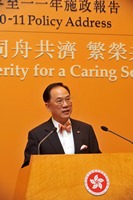 |
| No.10 October, 2010 |
|
| |
|
| |
Hong Kong Chief Executive outlines priorities in 2010-11 Policy Address |
|
| |
|
|
| |
 Hong Kong's Chief Executive Donald Tsang has prioritised stabilising the city's property market, strengthening links with China, economic development and more support for low income families over the next 12 months as part of his annual policy address. Hong Kong's Chief Executive Donald Tsang has prioritised stabilising the city's property market, strengthening links with China, economic development and more support for low income families over the next 12 months as part of his annual policy address.
In his October 13 address, Sharing Prosperity for a Caring Society, Mr Tsang singled out Hong Kong's volatile property market as the city's most pressing challenge, and announced new measures to boost the supply of apartments and help potential homebuyers enter the housing market. |
|
| |
|
|
| |
Committing to ensuring sufficient and stable land supply for the private residential market over the next decade, Mr Tsang also unveiled plans for a new subsidized housing program for small to medium flats.
The "My Home Purchase" Plan will provide flats for 5,000 first-time buyers, who will be given fixed rent for the property for up to five years before being given the opportunity to buy the property.
Other housing initiatives proposed by Mr Tsang included temporarily removing real estate from the investment asset classes under the Capital Investment Entrant Scheme, planning reforms to tighten gross floor area concessions for new developments, enhanced support for older residential buildings, and a new $500 million Urban Renewal Trust Fund to support revitalisation and preservation projects.
The Chief Executive said that Hong Kong would continue to strengthen links with China to ensure sustainable economic growth, leveraging the city’s advantages as part of the National 12th Five-Year Plan period.
Mr Tsang said that Hong Kong would enhance its status as an international centre for financial services, trade, shipping and logistics, and to develop the six industries where Hong Kong enjoyed clear advantages.
The Hong Kong Government will help service industries - medical services, education services, environmental industries, testing and certification services, innovation and technology and cultural and creative industries – expand their presence within the Chinese market.
"Hong Kong must ride on the opportunities brought about by the rise of our country, and make giant strides in our political, social, economic and cultural development in the coming decade," Mr Tsang added.
Mr Tsang also announced a range of measures to help low-income families, including higher subsidies to cover the cost of school textbooks, a new public transport subsidy, and the creation of a Community Care Fund – funded by the public and private sectors - to support people in need but who are not covered by the city’s social security system.
A number of reforms would better support senior citizens, including relaxing the allowable period of absence from Hong Kong under the Old Age Allowance and Disability Allowance, a study on a new allowance for senior citizens who retire to China and more resources for residential care homes and nursing homes.
The Policy Address also included measures to improve the environment, including an emissions reduction strategy emphasising the use of cleaner, low-carbon energy and fuels for power generation, and pledging to reduce carbon intensity by 50 – 60 per cent by 2020 from 2005 levels.
To reduce emissions from franchised buses, Mr Tsang has proposed government funding to retrofit Euro II and Euro III buses to meet Euro IV emission standards and support for bus companies wishing to test green transport options such as hybrid buses.
He said pilot low-emission zones would be set up in the city’s busiest districts such as Mong Kok, Causeway Bay and Central and that additional green provisions would be included when the bus franchises came up for renewal.
A $300 million Pilot Green Transport Fund will also be set up for application by the transport trade to explore more environmentally-friendly technologies.
| |
| |
|
|
|
| |
 |
|
|
| |
|
|
|
| |
|
|
|
|
 |

